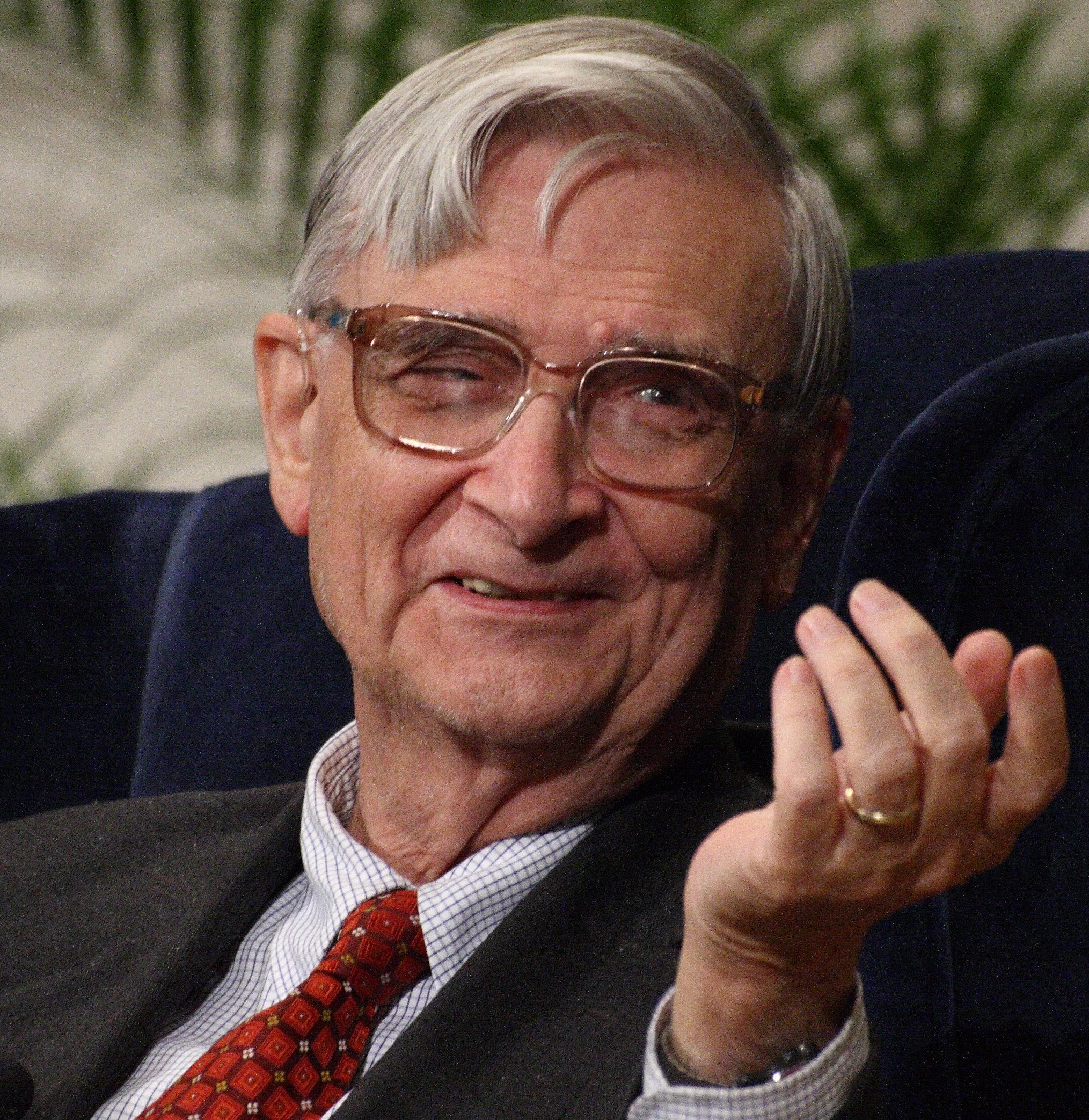Edward Osborne Wilson: Difference between revisions
No edit summary |
No edit summary |
||
| (5 intermediate revisions by the same user not shown) | |||
| Line 1: | Line 1: | ||
[[File:E._O._Wilson_sitting,_October_16,_2007_(cropped).jpg|thumb|Edward Wilson, 2007.]] |
|||
| ⚫ | |||
| ⚫ | |||
| ⚫ | Born in Alabama, Wilson found an early interest with nature and frequented the outdoors. At age seven, he was partially blinded in a fishing accident; due to his reduced sight, Wilson resolved to study entomology. After matriculating at the University of Alabama, Wilson transferred to complete his dissertation at Harvard University, where he distinguished himself in multiple fields. In 1956, he co-authored a paper defining the theory of character displacement; in 1967, he developed the theory of island biogeography with Robert MacArthur in Sociobiology: The New Synthesis. |
||
| ⚫ | Born in Alabama, Wilson found an early interest with nature and frequented the outdoors. At age seven, he was partially blinded in a fishing accident; due to his reduced sight, Wilson resolved to study entomology. After matriculating at the University of Alabama, Wilson transferred to complete his dissertation at Harvard University, where he distinguished himself in multiple fields. In 1956, he co-authored a paper defining the theory of character displacement; in 1967, he developed the theory of island biogeography with Robert MacArthur in Sociobiology: The New Synthesis.<ref>https://en.wikipedia.org/w/index.php?title=E._O._Wilson&oldid=1159379594</ref> |
||
| ⚫ | Wilson was the Pellegrino University Research Professor Emeritus in Entomology for the Department of Organismic and Evolutionary Biology at Harvard University, a lecturer at Duke University, and a fellow of the Committee for Skeptical Inquiry. The Royal Swedish Academy awarded Wilson the Crafoord Prize. He was a humanist laureate of the International Academy of Humanism. He was a two-time winner of the Pulitzer Prize for General Nonfiction (for On Human Nature in 1979, and The Ants in 1991) and a New York Times bestselling author for The Social Conquest of Earth, Letters to a Young Scientist, and The Meaning of Human Existence. |
||
| ⚫ | Wilson was the Pellegrino University Research Professor Emeritus in Entomology for the Department of Organismic and Evolutionary Biology at Harvard University, a lecturer at Duke University, and a fellow of the Committee for Skeptical Inquiry. The Royal Swedish Academy awarded Wilson the Crafoord Prize. He was a humanist laureate of the International Academy of Humanism. He was a two-time winner of the Pulitzer Prize for General Nonfiction (for On Human Nature in 1979, and The Ants in 1991) and a New York Times bestselling author for The Social Conquest of Earth, Letters to a Young Scientist, and The Meaning of Human Existence.<ref>https://en.wikipedia.org/w/index.php?title=E._O._Wilson&oldid=1159379594</ref> |
||
| ⚫ | Wilson's work received both praise and criticism during his lifetime. His book Sociobiology was a particular flashpoint for controversy, and drew criticism from the Sociobiology Study Group. Wilson's interpretation of the theory of evolution resulted in a widely-reported dispute with Richard Dawkins. |
||
| ⚫ | Wilson's work received both praise and criticism during his lifetime. His book Sociobiology was a particular flashpoint for controversy, and drew criticism from the Sociobiology Study Group. Wilson's interpretation of the theory of evolution resulted in a widely-reported dispute with Richard Dawkins.<ref>https://en.wikipedia.org/w/index.php?title=E._O._Wilson&oldid=1159379594</ref> |
||
When asked about communism Wilson is quoted as having said: |
|||
== Quote == |
|||
<blockquote> |
|||
"Great idea; wrong species." |
|||
<ref>https://www.psychologytoday.com/gb/blog/homo-consumericus/201101/communismsocialism-great-idea-wrong-species-e-o-wilson</ref> |
|||
</blockquote> |
|||
Wilson was making it clear that ants effectively act as communists and it is a very successful strategy for these species. In contrast, he argued, communism could not work for humans. |
|||
{{Bio}} |
{{Bio}} |
||
{{ |
{{Featured}} |
||
{{Science}} |
|||
{{US}} |
|||
== References == |
|||
Latest revision as of 10:54, 10 June 2023

Edward Osborne Wilson FRS (June 10, 1929 – December 26, 2021) was an American biologist, naturalist, ecologist, and entomologist known for developing the field of sociobiology.[1]
Born in Alabama, Wilson found an early interest with nature and frequented the outdoors. At age seven, he was partially blinded in a fishing accident; due to his reduced sight, Wilson resolved to study entomology. After matriculating at the University of Alabama, Wilson transferred to complete his dissertation at Harvard University, where he distinguished himself in multiple fields. In 1956, he co-authored a paper defining the theory of character displacement; in 1967, he developed the theory of island biogeography with Robert MacArthur in Sociobiology: The New Synthesis.[2]
Wilson was the Pellegrino University Research Professor Emeritus in Entomology for the Department of Organismic and Evolutionary Biology at Harvard University, a lecturer at Duke University, and a fellow of the Committee for Skeptical Inquiry. The Royal Swedish Academy awarded Wilson the Crafoord Prize. He was a humanist laureate of the International Academy of Humanism. He was a two-time winner of the Pulitzer Prize for General Nonfiction (for On Human Nature in 1979, and The Ants in 1991) and a New York Times bestselling author for The Social Conquest of Earth, Letters to a Young Scientist, and The Meaning of Human Existence.[3]
Wilson's work received both praise and criticism during his lifetime. His book Sociobiology was a particular flashpoint for controversy, and drew criticism from the Sociobiology Study Group. Wilson's interpretation of the theory of evolution resulted in a widely-reported dispute with Richard Dawkins.[4]
When asked about communism Wilson is quoted as having said:
Quote
"Great idea; wrong species." [5]
Wilson was making it clear that ants effectively act as communists and it is a very successful strategy for these species. In contrast, he argued, communism could not work for humans.
References
- ↑ https://en.wikipedia.org/w/index.php?title=E._O._Wilson&oldid=1159379594
- ↑ https://en.wikipedia.org/w/index.php?title=E._O._Wilson&oldid=1159379594
- ↑ https://en.wikipedia.org/w/index.php?title=E._O._Wilson&oldid=1159379594
- ↑ https://en.wikipedia.org/w/index.php?title=E._O._Wilson&oldid=1159379594
- ↑ https://www.psychologytoday.com/gb/blog/homo-consumericus/201101/communismsocialism-great-idea-wrong-species-e-o-wilson